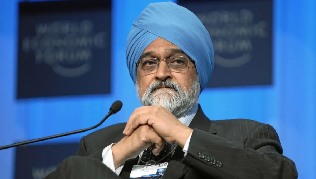The government should bring a Production Linked incentive (PLI) scheme for farmers instead of giving the fertilizer subsidy as this is hurting the farmers instead of benefiting them, says Montek Singh Ahluwalia, former Deputy Chairman of the Planning Commission.
Speaking in an exclusive conversation with ANI, Ahluwalia emphasized the need to shift the benefits of subsidies directly to farmers rather than supporting specific inputs like fertilizers. He pointed out that the fertilizer subsidy is not only benefiting the fertilizer industry but is also harming soil health due to overuse.
“Many agricultural economists believe that instead of spending large sums on fertilizer subsidies, we could give farmers a production-linked incentive. At the very least, we should stop subsidizing just one input, as it creates distortions,” he said.
Ahluwalia called for detailed consultations involving farmers, economists, and industry experts to determine the best way forward.
Montek Singh Ahluwalia: What Else Did He Said?
He also discussed the broader implications of the government’s PLI schemes, which are aimed at boosting manufacturing. While acknowledging the success of PLIs in new industries like mobile manufacturing and semiconductors, he criticized their application in traditional sectors like garments.
“PLIs should focus on industries where we lack experience, like chips, fabs, and battery manufacturing. For garments, a sector we already know well, PLIs make no sense. The problems in such sectors are often related to logistics, labour laws, or ease of doing business, not the lack of subsidies,” Ahluwalia noted.
He commended the government for successfully attracting major manufacturers like Apple, via Foxconn, to set up production in India. He recommended identifying five or six key new industries and offering incentives to bring in global manufacturers.
On the debate between focusing on manufacturing versus services, Ahluwalia agreed with former RBI Governor Raghuram Rajan’s view that India should leverage on its strengths in services, but manufacturing cannot be left behind.
“It’s not about choosing between manufacturing and services. India should play to its strengths in both. The growth in service exports, driven by global capability centers set up by high-tech manufacturers in India, is a testament to our capabilities in this sector,” he said.
Ahluwalia’s comments reflect a call for a more nuanced approach to policymaking, emphasizing long-term benefits and strategic priorities over short-term fixes. His insights highlight the need for careful planning to address economic challenges and unlock India’s potential.



